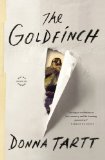Summary | Excerpt | Reviews | Beyond the Book | Readalikes | Genres & Themes | Author Bio

A Novel
by Donna Tartt
Thanks to my fever I had a lot of weird and extremely vivid dreams, sweats where I thrashed around hardly knowing if it was day or night, but on the last and worst of these nights I dreamed about my mother: a quick, mysterious dream that felt more like a visitation. I was in Hobie's shop—or, more accurately, some haunted dream space staged like a sketchy version of the shop—when she came up suddenly behind me so I saw her reflection in a mirror. At the sight of her I was paralyzed with happiness; it was her, down to the most minute detail, the very pattern of her freckles, she was smiling at me, more beautiful and yet not older, black hair and funny upward quirk of her mouth, not a dream but a presence that filled the whole room: a force all her own, a living otherness. And as much as I wanted to, I knew I couldn't turn around, that to look at her directly was to violate the laws of her world and mine; she had come to me the only way she could, and our eyes met in the glass for a long still moment; but just as she seemed about to speak—with what seemed a combination of amusement, affection, exasperation—a vapor rolled between us and I woke up.
ii.
THINGS WOULD HAVE TURNED out better if she had lived. As it was, she died when I was a kid; and though everything that's happened to me since then is thoroughly my own fault, still when I lost her I lost sight of any landmark that might have led me someplace happier, to some more populated or congenial life.
Her death the dividing mark: Before and After. And though it's a bleak thing to admit all these years later, still I've never met anyone who made me feel loved the way she did. Everything came alive in her company; she cast a charmed theatrical light about her so that to see anything through her eyes was to see it in brighter colors than ordinary—I remember a few weeks before she died, eating a late supper with her in an Italian restaurant down in the Village, and how she grasped my sleeve at the sudden, almost painful loveliness of a birthday cake with lit candles being carried in procession from the kitchen, faint circle of light wavering in across the dark ceiling and then the cake set down to blaze amidst the family, beatifying an old lady's face, smiles all round, waiters stepping away with their hands behind their backs—just an ordinary birthday dinner you might see anywhere in an inexpensive downtown restaurant, and I'm sure I wouldn't even remember it had she not died so soon after, but I thought about it again and again after her death and indeed I'll probably think about it all my life: that candlelit circle, a tableau vivant of the daily, commonplace happiness that was lost when I lost her.
She was beautiful, too. That's almost secondary; but still, she was. When she came to New York fresh from Kansas, she worked part-time as a model though she was too uneasy in front of the camera to be very good at it; whatever she had, it didn't translate to film.
And yet she was wholly herself: a rarity. I cannot recall ever seeing another person who really resembled her. She had black hair, fair skin that freckled in summer, china-blue eyes with a lot of light in them; and in the slant of her cheekbones there was such an eccentric mixture of the tribal and the Celtic Twilight that sometimes people guessed she was Icelandic. In fact, she was half Irish, half Cherokee, from a town in Kansas near the Oklahoma border; and she liked to make me laugh by calling herself an Okie even though she was as glossy and nervy and stylish as a racehorse. That exotic character unfortunately comes out a little too stark and unforgiving in photographs—her freckles covered with makeup, her hair pulled back in a ponytail at the nape of her neck like some nobleman in The Tale of Genji—and what doesn't come across at all is her warmth, her merry, unpredictable quality, which is what I loved about her most. It's clear, from the stillness she emanates in pictures, how much she mistrusted the camera; she gives off a watchful, tigerish air of steeling herself against attack. But in life she wasn't like that. She moved with a thrilling quickness, gestures sudden and light, always perched on the edge of her chair like some long elegant marsh-bird about to startle and fly away. I loved the sandalwood perfume she wore, rough and unexpected, and I loved the rustle of her starched shirt when she swooped down to kiss me on the forehead. And her laugh was enough to make you want to kick over what you were doing and follow her down the street. Wherever she went, men looked at her out of the corner of their eyes, and sometimes they used to look at her in a way that bothered me a little.
Excerpted from The Goldfinch by Donna Tartt. Copyright © 2013 by Donna Tartt. Excerpted by permission of Little Brown & Company. All rights reserved. No part of this excerpt may be reproduced or reprinted without permission in writing from the publisher.
Your guide toexceptional books
BookBrowse seeks out and recommends the best in contemporary fiction and nonfiction—books that not only engage and entertain but also deepen our understanding of ourselves and the world around us.